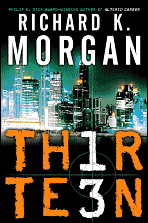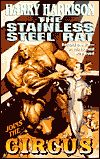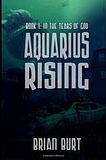
Voyagers II: The Alien Within, by Ben Bova
Book Review by Paul Weiss
A radio signal from a source near Jupiter announces to the scientists of this world that we are not alone. An intelligent extraterrestrial species is going to make a close fly-by to earth in a hyperbolic orbit of the sun that will allow one opportunity, and one opportunity only, to examine the starship, its occupants and its technology. In Voyager, the first novel of this trilogy, Keith Stoner, the American member of a joint US-Soviet mission to study the alien's ship, chose to stay aboard with the frozen alien's body. Knowing the rocket would rapidly move beyond the earth's ability to rescue him, he turned off his spacesuit's heaters and elected to flash freeze his body in the frigid temperatures of interplanetary space.
As Voyagers II opens, Keith Stoner awakes 18 years later in the laboratories of Vanguard Industries, the largest corporation on earth. Beyond all expectations, earth developed the technology to effect a rescue and somehow managed to revive his long frozen body from a state of suspended animation. His friend and erstwhile lover, Jo Camerata, using every resource at her disposal, has scrambled to the top of the industrial world. She is the President of Vanguard and her husband, Everett Nielsen, is the Chairman of the Board. Vanguard appears to be in control of the vast knowledge and technology that the alien and the spaceship have to offer and intends to keep it and use it for its own financial gain. However, Stoner, who has an unexplainable mental link with the alien intends to explore earth and ensure the technology is offered openly to a needy and unseemly venal world destined to encounter one global disaster after another.
When I reviewed Voyagers some months ago, I criticized Bova for taking a melodramatic, soap opera approach to the development of the relationships between the characters in the story. The men were portrayed as either heroes or wimps and the chauvinism with which he allowed his male characters to treat the females was simply beyond outrageous. Unfortunately, this weakness continues in Voyagers II and sinks to even lower lows. His dialogue is wooden and terribly contrived - not a great deal more realistic than one might expect from the humorous mangled English subtitle translations of Japanese B movies. The maniacal primary motivation for the evildoers of the novel seems to be world domination in a style that is not quite as subtle as the overlords of James Bond's arch-foe SMERSH.
Despite its glaring apparent weaknesses, Bova has nevertheless created a provoking tale of the possible effects of a close encounter of the third kind on world politics, religion, relationships, science, culture and mainstream life in the USA. The overwhelming need to use such advances in technology for the betterment of the world is obviously uppermost in Bova's mind and still makes Voyagers II an interesting read - if not one with an abundance of literary values. Which is certainly a shame! It isn't without merit but, as a novel, it's a bit of a disappointment.
Recommended, but only barely.
Paul Weiss
|
Click here to buy Voyagers II: The Alien Within, by Ben Bova on Amazon
|
Voyagers II: The Alien Within, by Ben Bova on Amazon

| More Books You Might Like |
| Comments on Voyagers II: The Alien Within, by Ben Bova |
| There are no comments on this book. |




